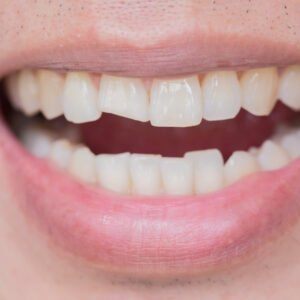
As hard and strong as our teeth are, certain forces can cause them to chip, crack, or even break completely. Instances like these can be painful in the moment and embarrassing to live with afterward—nobody wants to walk around with a piece of their smile missing! However, modern dental medicine and equipment provide plenty of methods for treating a broken tooth.
What Causes Broken Teeth?
You might think of a broken tooth only happening from acute trauma, like an accidental fall, impact from a ball or thrown object, or even a fistfight. However, teeth can crack or break for plenty of different reasons, and in plenty of different ways. Some of the most common causes of a cracked tooth include:
Continuous, sustained pressure from teeth grinding or “bruxism.” This condition is most associated with stress.
- Large or numerous fillings that weaken the tooth’s structural integrity.
- Biting down on hard foods like nuts or candy.
- Dental trauma from sports, accidents, or physical fights.
- Abrupt changes in temperature, like alternating between hot foods and iced drinks.
- Many dental studies now show that cracked teeth happen naturally as we age, with the majority of patients with cracked teeth presenting over the age of 50.
Cracked teeth can vary in severity as well. Cracks like “craze lines” or “fractured cusps” usually don’t require any sort of treatment as they occur in the enamel and don’t affect the pulp (the soft inner material of the tooth). They may not even be painful or otherwise present any symptoms.
Other types of cracks can extend into the pulp and into the gumline, sometimes affecting the root or even splitting the tooth entirely in half. These types of cracks are far more severe, and it’s unlikely that your dentist will be able to save them. In most cases, severely cracked teeth will have to be extracted—but don’t worry! There are several treatments available for restoring a cracked or chipped tooth.
Restorative Dentistry Treatment for Cracked Teeth
Modern dental medicine has come a long way in treating cracked teeth, and most contemporary options can make it look and feel as though your tooth was never injured in the first place. Some of the most common treatments include:
Dental Fillings
Your dentist may use a traditional type of dental filling to treat a cracked tooth where applicable, usually if the crack takes place in one of the molars and only extends throughout the surface enamel. This type of treatment is both long-lasting and effective—as effective as a filling would be to treat a cavity. Another similar procedure is called “bonding” where your dentist will use a type of plastic resin to seal the crack before it spreads. This treatment is better suited to the front teeth.
Dental Crowns
Crowns are a type of dental prosthetic made of either porcelain or enamel and are meant to fit over the affected tooth. In order to fit properly, your dentist must remove the cracked enamel with a dentist’s drill to make room for the crown, which is then permanently bonded to the filed tooth. Crowns are custom made and look and feel exactly like your original tooth. Crowns are durable and long-lasting, and with proper care, should last for a lifetime. Click here to learn more about the differences between dental crowns vs fillings.
Dental Implants
If too much of the tooth is broken, or if a crack extends too far into the root of a tooth, then your dentist will have no choice but to extract the tooth. In these cases, patients can seek a dental implant—a custom-made prosthetic tooth that is permanently affixed to the jawbone through a series of simple surgeries. Dental implants are performed by implanting a titanium anchor into the patient’s jawbone to ensure the resulting prosthetic is strong enough to handle the pressure required for a successful bite. After this anchor is healed and firmly in place, the prosthetic tooth is attached in place, where it can remain for a lifetime.
The Importance of Treating a Cracked Tooth
If a tooth is cracked, but isn’t obvious or doesn’t cause any pain, it can be tempting to hold on getting treatment for it. After all, if the tooth still functions, what’s the harm? Unfortunately, even a mild crack in a tooth can get worse over time. With repeated stress from biting, hot or cold food or drinks, or accidental trauma, what might have been a quick fix can become much harder to treat.
If a crack spreads to the pulp of the tooth, it can allow bacteria to travel within the entire structure of the tooth and even down into the roots and jaw. This can lead to infection and decay of the tooth, which can be both painful and unsightly, and potentially lead to far more serious problems later. Untreated tooth infection has even been shown to cause other major problems in the body, including heart disease!
What To Do If You Have a Cracked or Broken Tooth
If you experience trauma to a tooth that causes it to break, or if you notice that there are small cracks in your teeth that weren’t there before, it’s best to call your dentist right away and schedule an appointment now. Your dentist can better diagnose the extent of the fracture and advise you on the best course of treatment. If you are in pain, you can apply ice to the surrounding tissue to numb the affected area and control swelling until you can seek treatment or use an over-the-counter painkiller with your doctor’s approval. If you are a patient seeking treatment for a cracked tooth in Northern Nevada, call Champagne Family Dentistry as we are now offering restorative dentistry in Sparks, NV.

